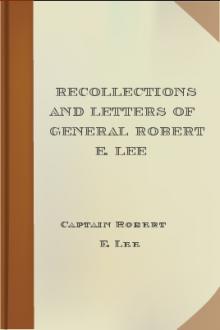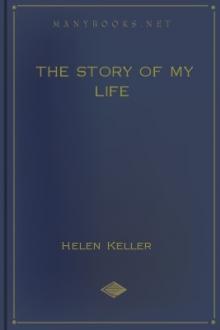Recollections and Letters of General Robert E. Lee by Captain Robert E. Lee (howl and other poems .txt) 📕

- Author: Captain Robert E. Lee
- Performer: -
Book online «Recollections and Letters of General Robert E. Lee by Captain Robert E. Lee (howl and other poems .txt) 📕». Author Captain Robert E. Lee
This is my second visit to Savannah. I have been down the coast to Amelia Island to examine the defenses. They are poor indeed, and I have laid off work enough to employ our people a month. I hope our enemy will be polite enough to wait for us. It is difficult to get our people to realise their position…. Good-bye, my dear daughters.
“Your affectionate father, “R. E. Lee.”
To his daughter Annie:
“Coosawhatchie, South Carolina, December 8, 1861.
“My Precious Annie: I have taken the only quiet time I have been able to find on this holy day to thank you for your letter of the 29th ulto. One of the miseries of war is that there is no Sabbath, and the current of work and strife has no cessation. How can we be pardoned for all our offenses! I am glad that you have joined your mamma again and that some of you are together at last. It would be a great happiness to me were you all at some quiet place, remote from the vicissitudes of war, where I could consider you safe. You must have had a pleasant time at ‘Clydale.’ I hope indeed that ‘Cedar Grove’
may be saved from the ruin and pillage that other places have received at the hands of our enemies, who are pursuing the same course here as the have practised elsewhere. Unfortunately, too, the numerous deep estuaries, all accessible to their ships, expose the multitude of islands to their predatory excursions, and what they leave is finished by the negroes whose masters have deserted their plantations, subject to visitations of the enemy. I am afraid Cousin Julia [Mrs. Richard Stuart] will not be able to defend her home if attacked by the vandals, for they have little respect for anybody, and if they catch the Doctor [Doctor Richard Stuart] they will certainly send him to Fort Warren or La Fayette. I fear, too, the Yankees will bear off their pretty daughters. I am very glad you visited ‘Chatham’ [the home of the Fitzhughs, where my grandmother Custis was born]. I was there many years ago, when it was the residence of Judge Coulter, and some of the avenues of poplar, so dear to your grandmama, still existed. I presume they have all gone now. The letter that you and Agnes wrote from ‘Clydale’ I replied to and sent to that place. You know I never have any news. I am trying to get a force to make headway on our defenses, but it comes in very slow. The people do not seem to realise that there is a war.
“It is very warm here, if that is news, and as an evidence I inclose some violets I plucked in the yard of a deserted house I occupy. I wish I could see you and give them in person…. Good-bye, my precious child. Give much love to everybody, and believe me, “Your affectionate father, “R. E. Lee.”
From the same place, on December 2d, he writes to my mother: “I received last night, dear Mary, your letter of the 12th, and am delighted to learn that you are all well and so many of you are together. I am much pleased that Fitzhugh has an opportunity to be with you all and will not be so far removed from his home in his new field of action. I hope to see him at the head of a find regiment and that he will be able to do good service in the cause of his country.
If Mary and Rob get to you Christmas, you will have quite a family party, especially if Fitzhugh is not obliged to leave his home and sweet wife before that time. I shall think of you all on that holy day more intensely than usual, and shall pray to the great God of Heaven to shower His blessings upon you in this world, and to unite you all in His courts in the world to come. With a grateful heart I thank Him for His preservation thus far, and trust to His mercy and kindness for the future. Oh, that I were more worthy, more thankful for all He has done and continues to do for me! Perry and Meredith [his two coloured servants] send their respects to all….
“Truly and affectionately, “R. E. Lee.”
From the same place, on Christmas Day, he writes to my mother: “I cannot let this day of grateful rejoicing pass, dear Mary, without some communication with you. I am thankful for the many among the past that I have passed with you, and the remembrance of them fills me with pleasure. For those on which we have been separated we must not repine. Now we must be content with the many blessings we receive.
If we can only become sensible of our transgressions, so as to be fully penitent and forgiven, that this heavy punishment under which we labour may with justice be removed from us and the whole nation, what a gracious consummation of all that we have endured it will be!
“I hope you had a pleasant visit to Richmond…. If you were to see this place, I think you would have it, too. I am here but little myself. The days I am not here I visit some point exposed to the enemy, and after our dinner at early candle-light, am engaged in writing till eleven or twelve o’clock at night…. AS to our old home, if not destroyed, it will be difficult ever to be recognised. Even if the enemy had wished to preserve it, it would almost have been impossible. With the number of troops encamped around it, the change of officers, etc., the want of fuel, shelter, etc., and all the dire necessities of war, it is vain to think of its being in a habitable condition. I fear, too, books, furniture, and the relics of Mount Vernon will be gone. It is better to make up our minds to a general loss. They cannot take away the remembrance of the spot, and the memories of those that to us rendered it sacred. That will remain to us as long as life will last, and that we can preserve. In the absence of a home, I wish I could purchase ‘Stratford.’ That is the only other place that I could go to, now accessible to us, that would inspire me with feelings of pleasure and local love. You and the girls could remain there in quiet. It is a poor place, but we could make enough cornbread and bacon for our support, and the girls could weave us clothes. I wonder if it is for sale and at how much. Ask Fitzhugh to try to find out, when he gets to Fredericksburg. You must not build your hopes on peace on account of the United States going into a war with England [on account of the Trent affair]. She will be very loath to do that, notwithstanding the bluster of the Northern papers. Her rulers are not entirely mad, and if they find England is in earnest, and that war or a restitution of their captives must be the consequence, they will adopt the latter. We must make up our minds to fight our battles and win our independence alone. No one will help us. We require no extraneous aid, if true to ourselves. But we must be patient. It is not a light achievement and cannot be accomplished at once…. I wrote a few days since, giving you all the news, and have now therefore nothing to relate. The enemy is still quiet and increasing in strength. We grow in size slowly but are working hard.
I have had a day of labour instead of rest, and have written intervals to some of the children. I hope they are with you, and inclose my letters….
“Affectionately and truly, “R. E. Lee.”
In the next letter to my mother he describes a visit to the grave of his father at Dungeness, on Cumberland Island, Georgia. Dungeness was presented to General Nathaniel Green by the State of Georgia for services rendered her in the Revolution. General Henry Lee, returning from the West Indies, where he had been for some months on account of his health, landed there, and in a few days died, March 15, 1818.
He was most kindly cared for by the daughter of his old commander, and was buried there in the garden of Dungeness. At the time of my father’s visit the place belonged to a great-nephew of General Green, Mr. Nightingale.
“Coosawhatchie, South Carolina, January 18, 1862.
“On my return, day before yesterday, from Florida, dear Mary, I received your letter of the 1st inst. I am very glad to find that you had a pleasant family meeting Christmas, and that it was so large. I am truly grateful for all the mercies we enjoy, notwithstanding the miseries of war, and join heartily in the wish that the next year may find us at peace with all the world. I am delighted to hear that our little grandson [his first grandchild—son of my brother Fitzhugh. He died in 1863] is improving so fast and is becoming such a perfect gentleman. May his path be strewn with flowers and his life with happiness. I am very glad to hear also that his dear papa is promoted.
It will be gratifying to him and increase, I hope, his means of usefulness. Robert wrote me he saw him on his way through Charlottesville with his squadron, and that he was well. While at Fernandina I went over to Cumberland Island and walked up to ‘Dungeness,’ the former residence of General Green. It was my first visit to the house, and I had the gratification at length of visiting my father’s grave. He died there, you may recollect, on his way from the West Indies, and was interred in one corner of the family cemetery.
The spot is marked by a plain marble slab, with his name, age, and her daughter, Mrs. Shaw, and her husband. The place is at present owned by Mr. Nightingale, nephew of Mrs. Shaw, who married a daughter of Mr. James King. The family have moved into the interior of Georgia, leaving only a few servants and a white gardener on the place. The garden was beautiful, inclosed by the finest hedge I have ever seen.
It was of the wild olive, which, in Mrs. Shaw’s lifetime, during my tour of duty in Savannah in early life, was so productive, had been destroyed by an insect that has proved fatal to the orange on the coast of Georgia and Florida. There was a fine grove of olives, from which, I learn, Mr. Nightingale





Comments (0)